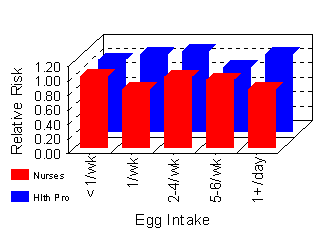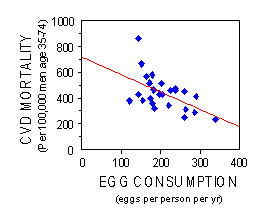The Good News About Eggs Just Got Better
A History of Debate
 |
Over the years there has been considerable debate whether eggs in the diet contribute to elevated plasma cholesterol levels and heart disease risk, or whether this is just an overly simplistic view equating dietary cholesterol with plasma cholesterol. Ever since the restrictions on dietary cholesterol and egg consumption were proposed in 1972, nutritional scientists have argued the question without reaching a resolution. One problem is that opinions had became so fixed that in many cases the heat of the debate put it in the category of religion and politics: topics not appropriate for polite conversation.
Even with thirty years of accumulated research showing that dietary cholesterol has only a small effect on plasma cholesterol levels, and that dietary cholesterol has little relationship to heart disease incidence, the dietary cholesterol and egg restrictions have become a staple of American dietary folklore easily incorporated into our fat-phobic, cholesterol-phobic life-style. But now that all seems to be changing and the consensus based on opinion is slowly giving way to an avalanche of research data showing that eggs are not the serious health concern they have been portrayed to be. Over the years eggs have literally become the icon for high cholesterol, both dietary and plasma, and it has taken considerable research efforts to prove that they do not belong in the “bad food group.” But oh how the health promotion groups hate to have to say that just maybe the over emphasis on dietary cholesterol and egg restrictions for the past three decades was not really justified!
Eggs and Heart Disease Risk
The April 21st issue of the Journal of the American Medical Association (JAMA1999;281:1387-1394) [1] reports a study by Hu and colleagues from the Harvard School of Public Health which found no relationship between egg consumption and cardiovascular disease in a population of over 117,000 nurses and health professionals followed for eight to fourteen years. There was no difference in heart disease relative risk between those who consumed less than one egg a week and those who ate more than one egg a day. The investigators followed 80,082 women for 14 years and 37,851 men for 8 years and looked at the incidence of nonfatal myocardial infarction, fatal coronary heart disease and stroke as related to daily egg consumption determined by food frequency questionnaires. As  shown in the figure, weekly egg consumption was unrelated to the relative risk of coronary heart disease in either the men or the women. Similar data were obtained for stroke relative risk. Interestingly, the investigators also found no significant increase in relative risk of coronary disease in a small subset of the study group who consumed two or more eggs a day relative to those who never consumed eggs (multivariate relative risk for women was 0.76 and for men 1.10). The authors did find that for diabetic subjects higher egg consumption was related to increased risk of coronary heart disease. The authors concluded that “These findings suggest that consumption of up to 1 egg per day is unlikely to have substantial overall impact on the risk of CHD or stroke among healthy men and women.”
shown in the figure, weekly egg consumption was unrelated to the relative risk of coronary heart disease in either the men or the women. Similar data were obtained for stroke relative risk. Interestingly, the investigators also found no significant increase in relative risk of coronary disease in a small subset of the study group who consumed two or more eggs a day relative to those who never consumed eggs (multivariate relative risk for women was 0.76 and for men 1.10). The authors did find that for diabetic subjects higher egg consumption was related to increased risk of coronary heart disease. The authors concluded that “These findings suggest that consumption of up to 1 egg per day is unlikely to have substantial overall impact on the risk of CHD or stroke among healthy men and women.”
It would be easy at this point to argue that this is only a single study, albeit in a very large population, and no single report should determine the national nutrition policy. regarding eggs and health. Fair enough argument except that this report is only one of a long list of recent studies showing that egg consumption, and dietary cholesterol intakes, are unrelated to either high plasma cholesterol levels or coronary heart disease incidence. The Harvard investigators have also reported that dietary cholesterol was not a significant factor in coronary heart disease risk in either the Nurses Health Study [2] or the Health Professionals Follow-Up Study [3]. Similar findings of a non-significant relationship between dietary cholesterol and coronary heart disease risk have been reported from the Lipid Research Clinics Follow-Up Study [4], the Framingham Heart Study [5], and the Alpha-Tocopherol, Beta-Carotene Cancer Prevention Study [6]. Data from the Multiple Risk Factor Intervention Trial (MRFIT) [7] actually reported an inverse relationship between dietary cholesterol intakes and plasma cholesterol levels at baseline as well as an inverse relationship between egg consumption and plasma cholesterol levels. Over the years a number of investigators have reported a null relationship between egg consumption and plasma lipid levels as well as between egg intake and coronary heart disease incidence [8-10]. The report by Hu et al. [1] represents the largest epidemiologic study to directly relate egg consumption and coronary heart disease risk and its findings are consistent with a considerable body of existing literature. This is not a case of a single, isolated, inconsistent study providing an aberrant finding; this is a case of consistency and uniformity of results: as leading to a single conclusion: egg consumption is not related to coronary heart disease incidence.
 These data are consistent with a number of other observations as well. Analysis of the relationship between per capita egg consumption and cardiovascular mortality rates for 24 countries indicates a negative relations. Three of the highest egg consuming countries in the world are Japan, Spain and France; countries which also have the lowest rates of cardiovascular mortality of any of the worlds industrialized countries. The consistency of the data showing that the cholesterol in eggs is not related to coronary heart disease risk should at some point in time raise questions regarding the need for specific numerical restrictions of egg consumption by the general public (“no more than 3 to 4 whole eggs a week”). The evidence clearly shows that “an egg a day is okay” and unrelate to heart disease risk.
These data are consistent with a number of other observations as well. Analysis of the relationship between per capita egg consumption and cardiovascular mortality rates for 24 countries indicates a negative relations. Three of the highest egg consuming countries in the world are Japan, Spain and France; countries which also have the lowest rates of cardiovascular mortality of any of the worlds industrialized countries. The consistency of the data showing that the cholesterol in eggs is not related to coronary heart disease risk should at some point in time raise questions regarding the need for specific numerical restrictions of egg consumption by the general public (“no more than 3 to 4 whole eggs a week”). The evidence clearly shows that “an egg a day is okay” and unrelate to heart disease risk.
No Easy Vindication
A spokesperson for the American Heart Association (AHA) stated “Egg consumption is associated with eating foods high in saturated fat such as bacon, red meat and whole milk. Most people eat two eggs, rather than one egg in a serving a single meal that contains double the amount of suggested dietary cholesterol.” [Complete version available at AHA News Releases.] I guess eggs are to blame for the company they keep hanging around those high saturated fat foods. Does this mean that if people who eat those high saturated fat foods don’t eat eggs they’ll not be tempted to eat them or that if people who are now avoiding those high saturated fat food started eating eggs their prudent diets would be ruined? And with this logic shouldn’t we also restrict the consumption of peas to assure that the public doesn’t put butter on them? I guess if eggs aren’t the plasma cholesterol raising problem we think they are then at least guilt by association is one way to maintain a rather outdated, scientifically unsubstantiated restriction on their consumption.
And what about the over consumption with all those people eating two eggs a day? The data from the Harvard study did not find that this was a documentable health concern, and per capita consumption data certainly argues against it becoming a population wide problem for the public. The peak of U.S. egg consumption was in 1945 with a per capita intake of 405 eggs per person per year. That equates to 7.8 eggs per week or 1.1 eggs per day. Todays intake is 244 eggs per person per year or 4.7 eggs per week, 0.7 eggs per day. And what seems to be lost in the spokespersons comment is that the 300 mg cholesterol per day recommendation should be considered as an average value considered over a number of days or a week [11]. Whether a consumer chooses to eat their 7+ eggs a week one a day or a couple every few days really shouldn’t matter to the AHA, unless, of course, one needs to find argumants for protecting that decision to restrict eggs in the diet made over 25 years ago.
Another spokesperson was quoted as saying that “The American Heart Association and other responsible public health associations won’t change their guidelines of 3-4 eggs per week.” It is amazing that highly qualified scientists would dismiss the findings of a major research report on the day of its publication and conclude that the results will have no effect on the nutritional policy of the organization. No evaluation, no deliberation, no discussion, no incorporation of these data into the existing body of knowledge on the question; only a terse dismissal because the findings disagree with preconceived opinions and biases. This is not a very reasonable way to formulate public nutrition policy or the most open minded scientific approach for evaluating new research findings. Does this mean that once nutritional policies are set they are solidified to the extent that there can be no adjustments or corrections based on science? Maybe it is time for those groups who think the science supports their opinions to put thier science to the test: lets have a real debate of the question with all sides providing documented evidence in support of their recommendations. Where did the 300 mg per day cholesterol number come from? What is the evidence that eggs increase the risk of heart disease and why are 3 to 4 eggs per week the limit? Let’s move away from the opinions of the 70s and get with the science of the 90s. We should be able to do better in our efforts to guide the public towards healthful, nutritious diets using science, not the consensusof a small group based on their uniformity of opinions.
REFERENCES
- Hu FB, Stampfer MJ, Rimm EB, et al. A prospective study of egg consumption and risk of cardiovascular disease in men and women. JAMA 1999;281:1387-1394.
- Hu FB, Stampfer MJ, Manson JE, et al. Dietary fat intake and the risk of coronary heart disease in women. N Engl J Med 1997;337:1491-1499.
- Ascherio A, Rimm EB, Giovannucci EL, Spiegelman D, Stampfer M, Willett WC. Dietary fat and risk of coronary heart disease in men: Cohort follow up study in the United States. Bmj 1996;313:84-90.
- Esrey KL, Joseph L, Grover SA. Relationship between dietary intake and coronary heart disease mortality: Lipid research clinics prevalence follow-up study. J Clin Epidemiol 1996;49:211-216.
- Millen BE, Franz MM, Quatromoni PA, et al. Diet and plasma lipids in women .1. Macronutrients and plasma total and low-density lipoprotein cholesterol in women: The Framingham nutrition studies. J Clin Epidemiol 1996;49:657-663.
- Pietinen P, Ascherio A, Korhonen P, et al. Intake of fatty acids and risk of coronary heart disease in a cohort of Finnish men – The alpha-tocopherol, beta-carotene cancer prevention study. Am J Epidemiol 1997;145:876-887.
- Tillotson JL, Bartsch GE, Gorder D, Grandits GA, Stamler J. Food group and nutrient intakes at baseline in the Multiple Risk Factor Intervention Trial. Am J Clin Nutr 1997;65(1) Suppl:228S-257S.
- Dawber TR, Nickerson RJ, Brand FN, Pool J. Eggs, serum cholesterol, and coronary heart disease. Am J Clin Nutr 1982;36:617-25.
- Gramenzi A, Gentile A, Fasoli M, Negri E, Parazzini F, La Vecchia C. Association between certain foods and risk of acute myocardial infarction in women. BMJ 1990;300:771-3.
- Fraser GE. Diet and coronary heart disease: beyond dietary fats and low-density- lipoprotein cholesterol. Am J Clin Nutr 1994;59:1117S-1123S.
- Krauss RM, Deckelbaum RJ, Ernst N, et al. Dietary guidelines for healthy American adults – A statement for health professionals from the Nutrition Committee, American Heart Association. Circulation 1996;94:1795-1800.
PRESS RELEASES
 |
Egg a day OK for healthy people
NEW YORK, Apr 20 (Reuters Health)Eating one egg per day does not increase a healthy person’s risk of heart disease or stroke, according to a study funded by the National Institutes of Health.
However, the study of over 100,000 people did suggest a link between egg consumption and heart risk in diabetics, a finding that “warrants further research,” write Dr. Frank Hu and colleagues at Harvard University in Boston, Massachusetts. Their study is published in the April 20th issue of The Journal of the American Medical Association.
“Our data suggest that consumption of up to 1 egg per day is unlikely to have substantial overall impact on the cardiovascular disease among healthy men and women,” the researchers report.
Public health advocates have long recommended that individuals limit their cholesterol consumption to 300 milligrams per day. Eggs contain approximately 213 milligrams of cholesterol each, leading to the traditional advice about limiting egg intake.
To investigate the impact of eggs on cardiovascular health, the Harvard authors examined data from two major US studies involving over 127,000 men and women followed for up to 14 years.
They report finding “no evidence of an overall significant association between egg consumption and risk of coronary heart disease or stroke in either men or women” in individuals who reported eating one egg per day.
These findings did not applied to diabetic individuals, however. According to the researchers, diabetics who ate at least 1 egg per day doubled their risk for heart disease compared with diabetics consuming less than one egg per week.
Overall, eggs were the source of nearly a third (32%) of the total dietary cholesterol of the study subjects.
So why isn’t daily egg consumption harmful to the cardiovascular health of healthy adults? Hu’s team point out that despite their high cholesterol content, eggs contain substantial amounts of healthy nutrients. “It is conceivable,” they write, “that the small adverse effect of cholesterol in an egg… is counterbalanced” by the effects of “…other nutrients including antioxidants, folate, other B vitamins, and unsaturated fats.”
“We hope the Harvard research will encourage the nutrition policy community to re-examine dietary recommendations intended to reduce heart disease risk,” said Dr. Donald McNamara, executive director ot the American Egg Board’s Egg Nutrition Center. “Severely restricting nutritious foods, such as eggs, from the diets of all Americans can actually do more harm than good in most cases, particularly for nutritionally vulnerable groups like children and older Americans.”
In a statement, American Heart Association (AHA) spokesperson Dr. Alice H. Lichtenstein says “these new data do not conflict with the AHA’s recommendations that healthy individuals consume no more than 300 milligrams of dietary cholesterol per dayabout the amount found in an egg.”
However, she points out that eggs are often associated with the consumption of other fatty, unhealthy foods, including bacon, red meat and whole milk. And Lichtenstein notes that ”most people eat two eggs, rather than one egg in a serving– a single meal that contains double the amount of suggested (daily) dietary cholesterol.”
SOURCE: The Journal of the American Medical Association 1999;281:1387-1394.

Egg a day unlikely to raise heart risk
By LORI VALIGRA CAMBRIDGE, Mass., April 21 (UPI) Having an egg a day is unlikely to increase the risk of heart disease or stroke in healthy people, Harvard University researchers say.
Although this appears to contradict current American Heart Association recommendations of no more than three to four egg yolks per week, the Harvard researchers and other public health experts still urge moderation in egg consumption. The study appears in Wednesday’s issue of The Journal of the American Medical Association.
Dr. Frank Hu, an epidemiologist at the Harvard School of Public Health who led the study, and his colleagues tracked the egg consumption of more than 100,000 health professionals who reported their eating habits. The study subjects were participants in two large, long-term health studies: The Nurses’ Health Study and the Health Professionals Follow-Up Study.
To avoid elevations in blood cholesterol and to reduce risk of coronary heart disease, the American Heart Association has advised the public to eat a maximum of 300 milligrams per day of cholesterol and limit egg consumption. Eggs contain about 213 milligrams of cholesterol each. Most of the cholesterol is in the egg yolk.
Hu said the study factors in eggs eaten plain and eaten as ingredients in pancakes or other prepared foods.
“Moderate egg consumption does not have a major effect on atherosclerosis (clogging of the arteries) and can be part of a nutritious and healthy diet as long as the overall diet is balanced,” Hu said.
Hu said the study does not give all people a green light to eat more eggs. He said people need to be cautious, especially diabetics and those with high cholesterol.
“Not everyone in the world can go and eat one egg per day,” said Dr. William Krauss, head of molecular medicine at the University of California at Berkeley and a member of the American Heart Association’s nutrition committee. “The American Heart Association and other responsible public health associations won’t change their guidelines of 3-4 eggs per week.”
Krauss added that most of the study participants were health professionals who ate well anyway and tended to eat fewer eggs.
The authors speculated that one reason an egg a day doesn’t seem to impact heart disease or stroke risk is because there might be nutrients in eggs that are beneficial in preventing coronary heart disease.
However, one group of people who seem to be at higher risk for coronary heart disease if they eat too many eggs are people with diabetes. The researchers said this might be because they have an abnormal cholesterol transport mechanism.
The average American ate 245 eggs per year in 1998, up from the 240 in 1997 but much lower than the peak of 402 in 1945, according to the American Egg Board, a Washington, D.C., group that represents egg producers.
The American Egg Board welcomed the results of the study, saying that eggs are a good source of protein and have 13 different vitamins and minerals.
“The Harvard research is really the culmination of a growing body of published data indicating that egg consumption does not measurably raise blood cholesterol levels or have an independent effect on heart disease risk,” said Donald McNamara, executive director of the American Egg Board’s Egg Nutrition Center.
He added, “We hope the study will once and for all exonerate the egg, so that people can enjoy its many nutrition benefits without unwarranted fears of dietary cholesterol.”
But Hu said people who eat eggs tend to eat them with other cholesterol-rich foods such as sausage or bacon.
Hu recommends not focusing on just one cholesterol-rich food, but on eating a healthy and balanced diet, reducing the intake of saturated fat (those that are solid at room temperature such as butter) and trans fat (vegetable oil that has been processed into a solid) and eating more grains, fruits and vegetables.

